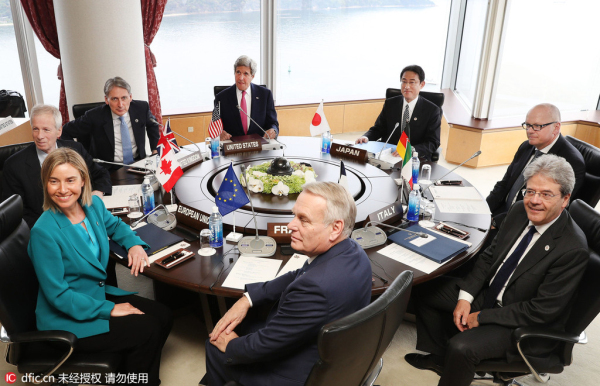Regional disputes should not be on the agenda at G7 summit
Updated: 2016-04-18 08:24
By Cai Hong(China Daily)
|
|||||||||
 |
|
US Secreatary of State Johon Kerry (background, L) and G7 countries foreign ministers, attend the first round of meeting, hosted by Japanese Foreign Minister Fumio Kishida (foreground, R) at a Hotel in Hiroshima Prefecture on April 10, 2016.[Photo/IC] |
With the G7 leaders convening in Japan this year, Prime Minister Shinzo Abe is eager to drive home the message that Japan is both a regional and a global leader.
Abe's ambitious foreign policy has already made him the most traveled Japanese leader in history. In just three years, Abe has visited more than 63 countries and held more than 400 summits.
As part of this policy, Japan has been seeking to make a military and political comeback in the strategically important region of the South China Sea. To this end, it has been working hard to improve relations with countries, such as Vietnam, the Philippines and Indonesia.
Now, as the chair of the upcoming G7 summit, Abe wants to showcase his country's global leadership credentials by pushing the "challenges" facing the Asia-Pacific region on the agenda of the high-profile international forum.
The G7 foreign ministerial meeting in Hiroshima last weekend seemed to set the tone for the summit of the leaders of Canada, France, Germany, Italy, Japan, the United Kingdom, and the United States in central Japan on May 26 and 27.
In a joint statement issued after their meeting, the G7 foreign ministers poked their nose into the territorial disputes in the East and South China Seas.
"We express our strong opposition to any intimidating, coercive or provocative unilateral actions that could alter the status quo and increase tensions, and urge all states to refrain from such actions as land reclamations, including large scale ones, building of outposts, as well as their use for military purposes and to act in accordance with international law including the principles of freedom of navigation and overflight," their statement said.
Chinese Foreign Minister Wang Yi has urged Japan to leave the issue of the South China Sea out of the agenda of the summit. None of the G7 countries represents the South China Sea region, and they should not concern themselves with the issue. China and the countries concerned can deal with their territorial disputes by themselves.
Related Stories
G7 'should avoid being hijacked' 2016-04-12 11:16
G7 on wrong course following lead of Japan 2016-04-12 07:42
Japan's hijacking of G7 meeting to meddle in South China Sea issues unjustified, harmful 2016-04-12 04:34
Beijing asks G7 not to hype South China Sea issue at Japan meeting 2016-04-10 09:51
Today's Top News
Inspectors to cover all of military
Britons embrace 'Super Thursday' elections
Campaign spreads Chinese cooking in the UK
Trump to aim all guns at Hillary Clinton
Labour set to take London after bitter campaign
Labour candidate favourite for London mayor
Fossil footprints bring dinosaurs to life
Buffett optimistic on China's economic transition
Hot Topics
Lunar probe , China growth forecasts, Emission rules get tougher, China seen through 'colored lens', International board,
Editor's Picks

|

|

|

|

|

|







